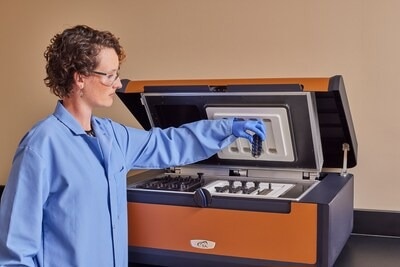Waters Corporation announced today the global release of the TA Instruments™ Rapid Screening-Differential Scanning Calorimeter (TA Instruments RS-DSC), designed for biopharmaceutical developers. The TA Instruments RS-DSC is a high-throughput DSC for precise thermal stability testing of high-concentration biologic formulations specifically for antibody drugs and engineered proteins.

Image Credit: Waters Corporation
"Demand is increasing for higher concentration injectable drugs, and biologic developers are looking for stability testing that is fast and efficient," said Jianqing Bennett, Waters Corporation Senior Vice President of the TA Instruments Division. "Our new Rapid Screening-DSC meets these needs by providing a high-throughput alternative to existing capillary DSCs and a more reliable and accurate option to differential scanning fluorescence (DSF) technologies."
The TA Instruments RS-DSC offers a more convenient and accurate solution to assess biological drug stability and quality by employing disposable, low sample volume microfluidic chips (MFCs) that enable up to 24 simultaneous measurements. This reduces or eliminates the need for sample dilution, repetitive instrument cleaning, and lowers contamination risk. Its unique design avoids the sensitivity challenges of DSF methods, enabling it to produce more accurate data on high-concentration samples.
Additionally, the TA Instruments RS-DSC features state-of-the-art automated software that provides rapid, effortless, precise, and in-depth insights about a sample's thermodynamic properties.
The TA Instruments RS-DSC is now available globally to all customers through the TA Instruments Division of Waters Corporation.